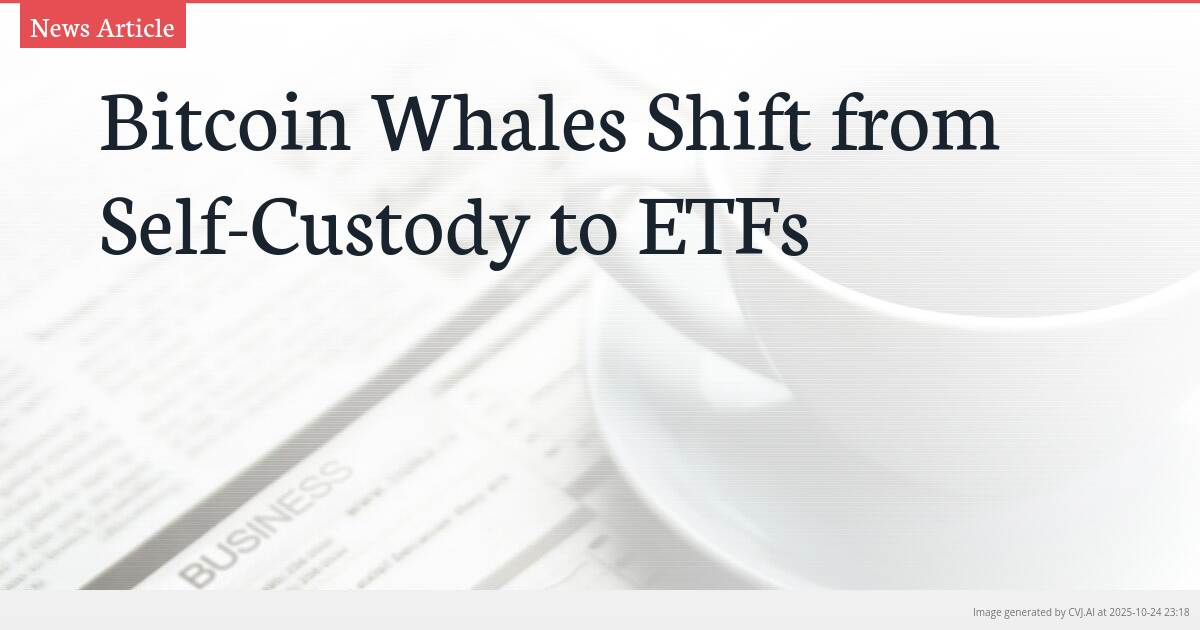This summary text is fully AI-generated and may therefore contain errors or be incomplete.
Introduction
Bitcoin’s earliest whales are abandoning their long-held self-custody principles in favor of traditional finance benefits. BlackRock executives confirm that veteran BTC holders are converting portions of their holdings to spot Bitcoin ETFs. This shift marks a significant departure from Bitcoin’s core philosophy as onchain self-custody breaks its 15-year uptrend.
Key Points
- BlackRock executives confirmed early Bitcoin whales are converting spot positions to ETFs for wealth management access
- Onchain self-custody of Bitcoin has broken its 15-year continuous uptrend as ETF adoption accelerates
- The shift represents a philosophical departure from Bitcoin's core decentralized principles toward traditional finance benefits
The Great Migration: From Private Keys to Traditional Finance
In a development that signals a fundamental shift in Bitcoin’s ecosystem, early BTC whales who once championed the cryptocurrency’s decentralized ethos are now quietly migrating toward traditional finance structures. According to recent revelations from BlackRock executives, several of Bitcoin’s original holders are converting portions of their spot positions to exchange-traded funds (ETFs), trading the sovereignty of self-custody for the convenience and institutional benefits of TradFi. This movement represents more than just a portfolio adjustment—it marks a philosophical departure from the principles that have defined Bitcoin since its inception.
The appeal of ETFs for these veteran holders lies in the broader wealth management tools and institutional infrastructure that traditional finance provides. While self-custody offered complete control and independence from financial intermediaries, ETF conversion grants access to sophisticated portfolio management, estate planning services, and integration with conventional investment frameworks. For whales who have held Bitcoin since its early days, the transition represents a pragmatic evolution in how they manage and leverage their substantial crypto wealth within the broader financial landscape.
Breaking a 15-Year Trend: The Data Behind the Shift
The scale of this migration becomes evident when examining onchain data, which reveals that self-custodied Bitcoin has recently broken a 15-year uptrend that had persisted since Bitcoin’s creation. Analyst Willy Woo’s observations highlight the correlation between accelerating ETF adoption and this historic decline in self-custody. The timing is particularly significant—the breaking of this long-standing trend coincides precisely with the rapid expansion of spot Bitcoin ETF products in the United States market.
This data point represents more than just a statistical anomaly; it signals a potential turning point in how major Bitcoin holders approach asset management. The consistent 15-year uptrend in self-custody reflected Bitcoin’s core value proposition of financial sovereignty and independence from traditional banking systems. The reversal suggests that even the most committed early adopters are now weighing the benefits of institutional integration against the ideological purity of complete self-custody, with many finding the practical advantages of ETFs increasingly compelling.
Broader Market Implications and Industry Developments
The whale migration toward ETFs occurs alongside other significant developments in the cryptocurrency and traditional finance intersection. Ripple continues to make strategic moves in public markets, while Galaxy Digital reported standout Q3 earnings that reflect the growing institutional interest in cryptocurrency infrastructure. Meanwhile, financial technology company Wise is exploring potential stablecoin expansion, indicating broader momentum toward integrating cryptocurrency solutions within traditional financial frameworks.
These parallel developments suggest a maturing ecosystem where the boundaries between cryptocurrency and traditional finance are becoming increasingly blurred. The movement of early Bitcoin whales toward ETFs represents just one facet of this broader integration trend. As institutional products like BlackRock’s spot Bitcoin ETF gain traction, they’re not merely attracting new investors but are actively converting some of Bitcoin’s most established holders. This dynamic could fundamentally reshape Bitcoin’s market structure, potentially increasing correlation with traditional markets while reducing the influence of the original decentralized ethos that characterized Bitcoin’s first decade and a half.
📎 Read the original article on cointelegraph.com

